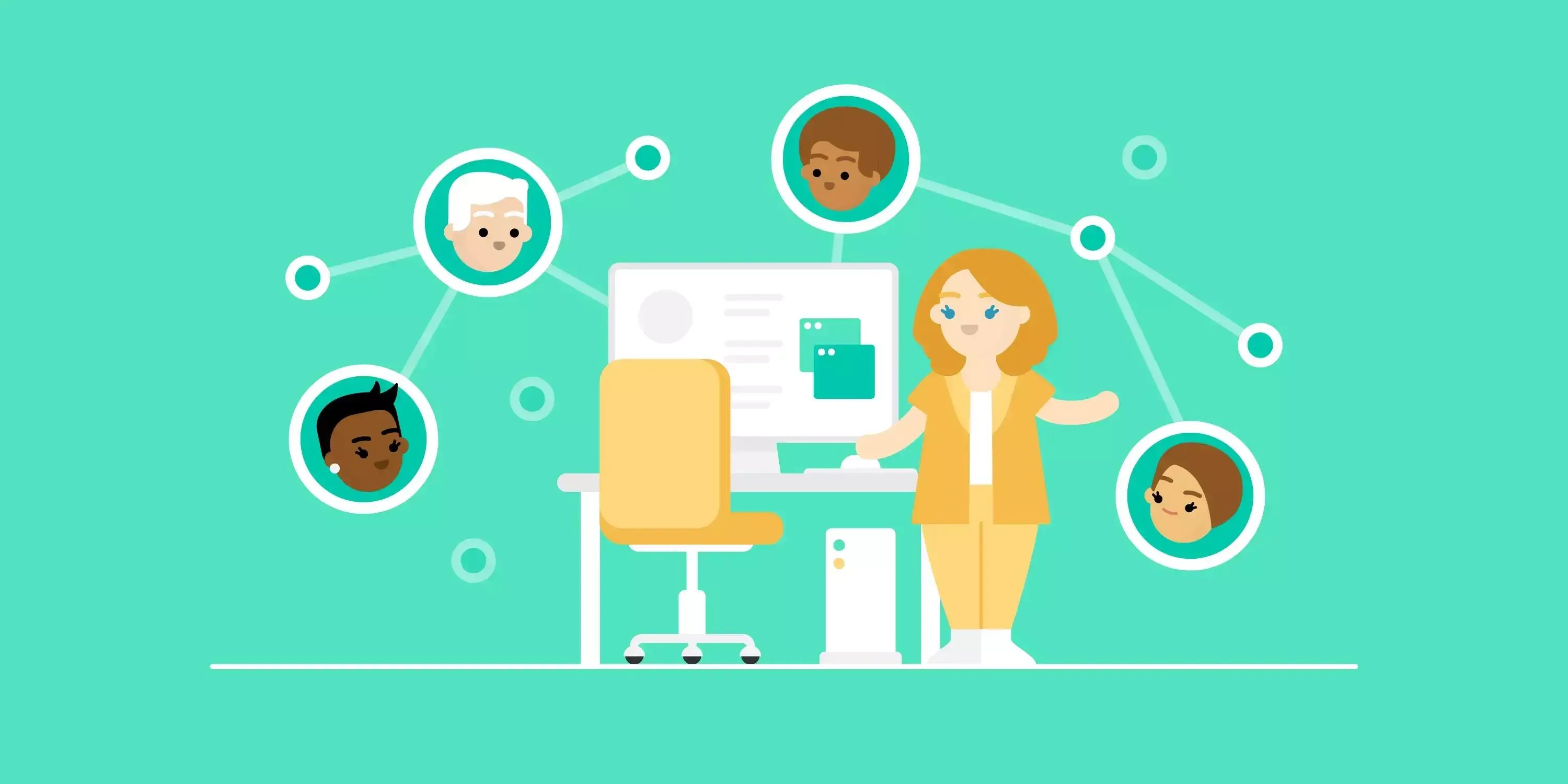The Ultimate Online Networking Guide [W/ Tips & Statistics!]
Updated on 02/24/2026

The digital era hasn’t diminished our need to network with others to build our professional and personal relationships.
If anything, it made networking even more useful! Instead of being limited to meeting professionals in your immediate area, you can now connect with people all over the world via online networking.
Doing online networking, though, can seem a bit daunting as it requires knowing how to use specific tools, online platforms, knowledge of how to effectively communicate online, and so on.
Fortunately for you, we’ll cover all of those and more in this article!
Read on to learn all you need to know about online networking, including:
- What Is Online Networking?
- 7 Benefits of Online Networking
- 5 Drawbacks of Online Networking
- 8 Tips to Get Online Networking Right
And much more! Let’s dive right in!
What Is Online Networking?
As the name implies, online networking is just like traditional networking done online.
Online networking aims to enable people to meet each other, exchange ideas, advance their careers, and make professional connections online (as opposed to locally at an event).
Online networking can be done in several different ways:
- On social media platforms like LinkedIn. All you have to do is look up professionals you’re interested in meeting and send them a text. Similarly, you can discover new events and look for jobs through said networking platforms.
- Through online networking events, which are typically just like traditional networking conferences that are organized online. At online networking events, you can ask questions (via mic or chat), and interact with other attendants.
- Via email, you can reach out to just about anyone you want to engage with. E.g. read an interesting article online? You can send an email with the goal of getting on a call with the author and sharing insights.
Usually, online networking is a great alternative for introverts who might often feel reluctant to attend networking events and communicate with people face-to-face. By networking from the comfort of their homes, introverts might feel more comfortable and willing to socialize, especially when it comes to professional networking.
7 Benefits of Online Networking
With the persisting increase of remote work, online networking is becoming the status quo.
This shouldn’t be all that surprising, considering all the benefits that online networking comes with:
- It’s more convenient. Instead of getting dressed and attending networking events or packing up and traveling to conferences, online networking lets you do all that from the comfort of your home.
- It’s less expensive. The only thing you need when it comes to online networking is your laptop and a strong internet connection.
- It’s more inclusive. Traditional networking events oftentimes make it difficult to talk to keynote speakers or other “important” faces in the crowd. This, however, is not the case when you’re attending, say, an online networking event, where it’s much easier for everyone to ask questions and get an answer.
- It’s more comfortable. Traditional networking can feel intimidating, especially if you’re a beginner in the industry. Instead of gathering the nerves to go and strike up a conversation with someone across the room, online networking removes the awkwardness by allowing you to network from your “safe space.”
- It’s more international. For most people, traditional networking implies being limited to events happening near your area. With online networking, you can attend international events and make business connections worldwide.
- It lets you decide the level of engagement. Want to talk to someone face-to-face? You can do video calls. Prefer to connect with someone, ask a quick question, and drop off? You can send a message on LinkedIn. Networking online gives you a lot more options on how, exactly, you can network.
- You can break the ice more easily. A computer screen makes it easier for most people to break the ice with other event attendees, whereas not everyone has the best communication skills to apply to traditional, face-to-face networking events.
5 Drawbacks of Online Networking
Nothing is absolutely perfect, and online networking is no different.
Here are 6 drawbacks of online networking you should keep in mind:
- Sometimes, it’s too easy. Just like online networking can make it very easy to send a bunch of networking emails, connection invites, etc, it also makes it easier for the receiver to delete your messages or ignore you altogether. The truth is that you’ll need to send personalized messages or come up with clickbaity networking email subject lines to ensure that the people you’re reaching out to open your message and get back to you.
- It takes more time. Very few things can establish the same trust and feeling of connectedness as face-to-face communication can. As such, connecting with people online is going to take twice the effort it would in real life.
- You may get scammed. It’s easier to fall victim to scammers online than it is when meeting them face-to-face, especially if you’re reaching out to strangers. Considering how easy it is to create a fake persona online, make sure to do your fair share of research before you reach out to people.
- Lacks emotional connection. Unfortunately, a computer screen can harm the emotional connection you create with people during networking events, although it’s exactly these connections that make a meeting memorable. A warm smile, a joke, or a firm handshake, for example, aren’t really an option when you’re networking online.
- Decreases face-to-face communication skills. Traditional networking may make you feel uncomfortable, but it sure hones your communication and networking skills, including empathy, active listening, and non-verbal communication. Online networking, on the other hand, usually has the exact opposite effect.
8 Tips to Get Online Networking Right
Do you still feel insecure about networking online? We don’t blame you! Online networking can be very confusing, especially if you’ve never actually done it before.
Here are 8 tips for networking online that can help you make new connections and expand your professional network:
- Set your objectives. Knowing exactly what you’re looking to get out of networking can help you use your time online effectively. That includes choosing the right networking events, emailing and connecting with relevant people, and the sorts.
- Look for LinkedIn alternatives. LinkedIn may be the biggest professional network in the world, but it’s definitely not the only one. By exploring other options, like MeetUp or Xing, you’ll have more opportunities and less competition.
- Be helpful. Sometimes, what will make a difference between an answered networking email and a deleted one is showing what you can do for the receiver. Considering how impersonal online networking can be, being helpful when you reach out to people online can be essential in establishing a connection.
- Be an intermediary. To make long-lasting connections when you’re networking online, you want to stay in people’s memories for longer than an email exchange or a quick catch-up over coffee. A great way to do that is to be an intermediary in your networking circle and introduce your connections to one another. That way, you’ll be remembered in more ways than one.
- Respect others’ boundaries. One of the worst things you can do when networking online is forcing people to network with you by, say, spamming them with tens of emails. It’s important to keep in mind that most people are busy and might not always have the time to cater to your needs, so respecting other boundaries as you try to network with them is essential if you don’t want to come off as disrespectful.
- Follow up with your connections. Not following up with your connections is just as bad as bombing them with connection requests or emails, as it’s a recipe for being forgotten. As such, make it a rule to always follow up with relevant people after your first interaction, even if it’s to tell them you appreciated meeting them.
- Engage in online communities. Participating in online communities, such as Quora or even Reddit, is a great way to network online successfully. You can share insight on different topics that interest you or belong to your industry, gain valuable insight from others, and connect with like-minded people.
- Add value to the community. While participation is key when you’re networking professionally online, you shouldn’t do it just for the sake of it. What we mean by this is that if you don’t really have something to say, you’re better off actively following the conversation instead of butting in. To be able to add value to the community, stay informed, follow industry trends, and always try to learn new things.
Online Networking Statistics
Online networking is very important for your career, and there are statistics out there to back this up.
Some of the most insightful ones are as follows:
- 85% of all vacancies today are filled through networking referrals.
- 40% of people prefer online networking over in-person networking.
- Social media platforms are used by 60% of the world’s population, a fact that makes them one of the best ways to connect with people online.
- A LinkedIn study showed that 35% of its participants found new opportunities, got business deals, and landed jobs via casual messaging with their contacts on the network. At the same time, some 61% of participants believe that regularly networking with their online connections can lead to possible job opportunities.
- Numbers suggest that spending time networking on social media platforms can be extremely helpful in finding a job. According to a study, 14% of the workers found and applied to their current job using social platforms such as Linkedin or Facebook.
- 70% of employers use social media to evaluate potential employees and vice versa.
- According to a Forbes study, the biggest benefits of online networking are that it saves time and money, that it’s more flexible, and that it allows participants to multitask. Additionally, it increases productivity and causes less peer pressure.
Key Takeaways
And that’s a wrap! Now you know everything around online networking, including how to ace it the next time you set out to do it!
Before you go, here are the main points we covered in this article:
- Online networking is just like traditional networking, but it happens online, particularly on social media platforms like LinkedIn, on online networking events, through networking emails, etc.
- Some of the biggest benefits of online networking are that it’s more convenient, less expensive, more comfortable, more inclusive and it lets you expand your reach outside your physical area.
- As for the drawbacks, those are that it’s easier for people to ignore your networking invites online, that establishing meaningful relationships often takes more time online, that it lacks emotional connection, and that it decreased communication skills.
- Some tips for online networking include taking advantage of LinkedIn alternatives, acting as an intermediary between your connections, being helpful, adding value to the community, following up with people, and respecting others’ boundaries.



